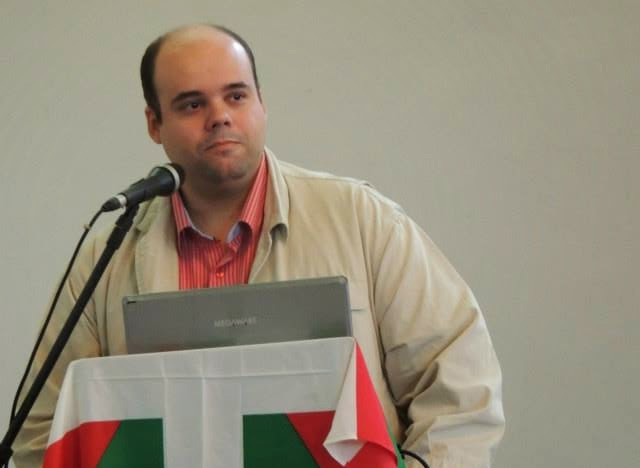Begoña Miñaur. The Brazilian genealogist, Diego Moreira Larrabeiti is one of the members involved in the current emergence and vitality of the Rio Grande do Sul Basque club. Moreira supports the project “For a Basque-Brazilian Genealogy,” that intends to “research, catalogue, map and publish genealogical information on immigrants of Basque origin to Brazil.” A huge amount of work has already been done and has taken big steps.
-How did you start in genealogy?
-I always liked it. I think that it has something to do with the love that I have for my family Genealogy is a way to perpetuate our existence. If death is inevitable, then we can live in the memory of our descendants. So when my children were born it encouraged me to progress in my research. I think that genealogy also contributes to the construction of our identity. With genealogy we know more about our ancestors and the cultural reality that they entered into, which lets us see a part of them in us.
-Where is your family from?
-The Basque side comes from Bizkaia. My great grandmother, Pura Larrebeiti Goiri, was from Derio and a descendant of the Larrabeitis from Mungia and the Goiris from Derio. Her paternal grandmother, Malzarraga Aspe, was from Baranbio in Araba. I have only been able to identify relatives in these two Basque territories so far.
-In Euskadi, the Basque community in Brazil isn’t very well know. Are there a lot of Basque descendants?
-The population of Brazil is over 200 million inhabitants. Even though Basque immigration wasn’t one of the largest in the formation of Brazil, we can imagine that there are a great number of Basque descendants in the country.
-Is it a recent or ancient migration?
-We know that there have been Basques in Brazil since the sixteenth century. This is the case of the Jesuits like Juan de Azpilicueta and San Jose Anchieta, priests that came to Brazil in 1549 and 1553 respectively. With Manoel de Nobrega, Anchieta founded the College of Sao Paulo on January 25, 1554, creating the urban nucleus for Sao Paulo, the largest city in Brazil. But the majority seemed to come in the big migrations of the nineteenth century. At this time the work conditions in Brazil weren’t great and there was slavery. Even free working conditions were bad. So that’s why we believe that many Basque preferred to settle in other South American countries, like Uruguay, or Argentina, where the work conditions were less degrading and so they went to Argentina or Uruguay before coming to Brazil.
The most significant Basque presence is in the south and we also have many descendants in Sao Paulo. I live in Rio de Janeiro and have had contact with some families settled there, but I have received messages from Basque descendants even from Amazonia.
-Let’s talk about the Basque Genealogy Brasileira project. What is your goal?
-The Project “For a Basque-Brazilian Genealogy,” is intended to research, catalogue, map, and publish informative genealogy books on Basque immigrants in Brazil. So the central figure is the immigrant that is the link between the two worlds. From the immigrants, we want to describe their ancestry and descent. As more families are included in the project, the greater our Basque Brazilian mosaic.
-Who is on your team?
All of the families that are part of the club are participating. My work consists in organizing the gathered information. The project is linked to the group or department of genealogy of the Rio Grande do Sul Basque club, in which I participate along with Elimar Insaurriaga, who is also a genealogist, and researcher for the project.
-What initial steps are thinking about taking?
-We are working to mobilize families in the dissemination of the project. We need Basque descendants in Brazil do know that we have begun this work and that we want to share it. At the same time, we are starting to organize what has been transmitted to us by the families that are already participating.
-What Basque families have you already studied?
-We started with my own family, the Larrabeitis. Elimar is working on the Insaurriagas along with his cousin Eduardo. Among the families who want to participate in the project so far are the Alavas, Ezquiogas, Gondras, Iribarrens and Aguirres. There is already research done on the Escosteguys and the Irigoyens. We are ready to include more, depending on the families’ interest.
-The Rio Grande do Sul Basque club…
-It was recently created, but it is very active.
-Why create and associate with a Basque club?
-Until 2012 i didn’t even know that Basque clubs existed. Today I am a founder of one, as a researcher. We celebrated gastronomic festivals and other events, and in July of this year we held the First Brazilian Congress on Basque Culture. I think that a big part of this movement is owed to the efforts of Ana Luiza Etchalus, that has fought hard for this union that we enjoy so much today, succeeds. This project is a way to keep us motivated.
-Have you been to the Basque Country?
-Never. But I would like to get to know the land of my ancestors. And research. I would like to spend time going through the archives, searching for better genealogical information than that available on the internet. Our research is free for families, so that this trip would have to be paid for by me, and right now I can’t affort it.
-If anyone would like to contact you, what should they do?
-They can email me at: diegomoreirageo@gmail.com or leave a message on the project’s blog: bascosnobrasil.blogspot.com.br






 Send to a friend
Send to a friend Add comment
Add comment








